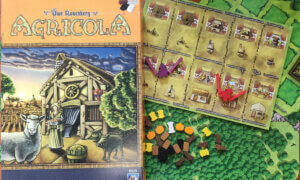Uwe Rosenberg Plants a Field
Chirping birds, green grass, the fresh smell of victory points. All three are hallmarks of Uwe Rosenberg, a designer who turns the quaint into the quantifiable, the rustic into the ruthless, and a campfire into a contest. Rosenberg’s titles are deceptively deep, using pleasant themes and simple turns to keep you moving, while providing a broad field with strategies aplenty to explore in game after game.
So put down your phone, turn off the computer, and escape the rush with one of these classics.
Down on the Farm
While not Rosenberg’s first game, Agricola’s likely the winner in name recognition. Almost old enough to drive, but plenty spry and spicy, this worker-placement gem is about the best farm builder you’ll find.
A variable setup coupled with expanding spots to drop your nifty meeples gives every new game a fresh feel, one that quickly turns into a tight, taut dance with your fellow farmers as crops, animals, and coveted chances to, well, expand your family get snagged one by one. When Cattleman Dan has his eyes on the cows, you’d best consider stealing the spot before he gets there, because Agricola rewards devious play.
Or you could soak in the summer sun, take a deep breath, and take what comes. Build a fence, maybe bake some bread. You’ll need the food to feed your family, as any left to go hungry will get their vengeance by snacking on some victory points instead.
This balance between growing your farm and family, keeping them fed and happy, while also stepping on your buddy’s toes is what separates Agricola from the multiplayer solitaire pack. Sure, you’re competing for a high score, but it’s not the numbers you’ll be cursing when your former pal grabs the goats before you do.
If taking a trip to the farm sounds like fun, be aware Agricola comes in a bevy of different editions. The Agricola: Revised Edition from 2018 is a good start for most folks, containing an updated list of bonus cards and other updates. Otherwise, an earlier Agricola can be coupled with any number of expansion decks to suit your farming desires. A deluxe 15th Anniversary Edition is out there too if you’re looking for a big box option.
Mine Time
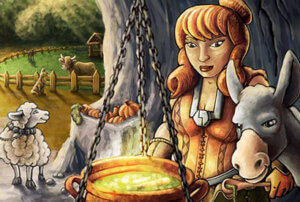 If you’re not feeling farmland, how about rocks and caves? Caverna is a follow-up to Agricola in many ways, with growing your family being the game’s focal point. Ditching the crops for the caverns, though, brings with it a wider option array, leading to a friendlier game. You won’t need to smack each other away from spaces nearly so often in Caverna, and the mountain exploration lends a bit more adventure to the play. Rather than griping over plowed fields, you can grin at your rubies.
If you’re not feeling farmland, how about rocks and caves? Caverna is a follow-up to Agricola in many ways, with growing your family being the game’s focal point. Ditching the crops for the caverns, though, brings with it a wider option array, leading to a friendlier game. You won’t need to smack each other away from spaces nearly so often in Caverna, and the mountain exploration lends a bit more adventure to the play. Rather than griping over plowed fields, you can grin at your rubies.
And then gripe over those plowed fields anyway, because Uwe’s not going to give up the farm so easily. Yes, Caverna retains those vegetables, those goats, but this time you’ve got weapons! Expeditions! Dogs and donkeys!
It’s an easy criticism to call Caverna an over-stuffed version of its leaner, meaner sibling, but that’s kind of the point. Caverna’s a great game for someone who likes the idea of farming, family, and finding treasure but doesn’t want to stress so much over every move.
Caverna also offers a larger player count, so you can grow your family with up to six (!) friends. Turns aren’t complex, though, so I’d only recommend stacking this many people at the table if they’re all experienced and ready to speed along, otherwise, you’ll be checking your watch as you wait. Still, with Agricola generally capped at 4, Caverna’s the better farm builder if you’re hosting larger parties.
Also like Agricola, expansions offer more variability, with Caverna: The Forgotten Folk worth a particular look if asymmetric factions are your jam. This one adds new species to the game, bringing elves, trolls, and more to your dwarf-dwelling dance-off.
Tilting at Windmills
Rosenberg tempts us away from the classic farm with Hallertau, a game about . . . growing hops. Okay, but hey, this farm’s doing things a little different. For one, you have to manage more than just planting your fields. Letting them lie fallow at the right times can boost your yield. The worker placement takes on a different heat than Agricola or Caverna too, turning outright blocking into an increased cost: the weekly market might only need one worker for the first player, but two for the second, and so on.
In other words, how much is that sheep worth to you?
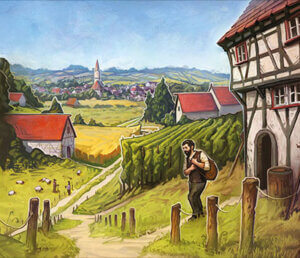 Hallertau ups the skill floor from Rosenberg’s earlier titles, adding in card combos and more moving parts to track. While this makes for a more intimidating first game, Hallertau presents a dynamic puzzle that’ll grow with you as you play.
Hallertau ups the skill floor from Rosenberg’s earlier titles, adding in card combos and more moving parts to track. While this makes for a more intimidating first game, Hallertau presents a dynamic puzzle that’ll grow with you as you play.
Those plays, too, can come solo, as Hallertau has a strong solo mode leveraging semi-random quadrant cards. These are essentially events, like harvests in Agricola, with some always occurring within a given window while others could be entirely random. Planning, and planting, for these cards makes for a crunchy solitaire challenge.
That randomness, though, is arguably the biggest factor separating Hallertau from its peers. It’s no dice-chucker, but a key card drawn here and there can make a major difference to your final score. If you prefer a little bit of luck in your euros, then I’d give Hallertau the nod.
Wheeling and Dealing
My friends, we’ve escaped the farm. In Glass Road, there’s not a sheep in sight. Instead, you’re—stick with me here—making glass. Unlike the last three games, Glass Road doesn’t rely on workers. At least, not in meeple form. Instead, you’re playing specialist cards, each one helping you clear land, produce new goods, or construct buildings (among other things). What could’ve been a turn-by-turn snooze, though, instead morphs into poker-style bluffing and deduction, as what specialist you play must, in turn, be played from the hands of your opponents. But, and this is the key, playing a specialist that nobody else has lets you activate both its abilities. By keeping your hand unpredictable, you’ll get bonus actions round after round, spinning Glass Road’s resource wheels like a Renaissance DJ.
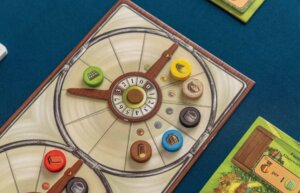 Wheels, you say? Indeed, and not the kind on a wagon, either. Glass Road uses literal wheels to track resource availability, with every player needing to manage their own premium and basic resources while building up your glass empire. These nifty gadgets spin when resources are gained, converting basic water and such into glass or brick, but, because you might be forced to play specialists unexpectedly, those wheels could turn when you don’t want them to, requiring more than a little planning.
Wheels, you say? Indeed, and not the kind on a wagon, either. Glass Road uses literal wheels to track resource availability, with every player needing to manage their own premium and basic resources while building up your glass empire. These nifty gadgets spin when resources are gained, converting basic water and such into glass or brick, but, because you might be forced to play specialists unexpectedly, those wheels could turn when you don’t want them to, requiring more than a little planning.
Of the games we’re talking about here, Glass Road is the tightest one, with every action flowing right into others. Misplays and mistakes can pile up, breaking down your engine, and letting you glance at your friend’s humming estate with envy. But with its svelte play time, particularly after your first couple games, Glass Road can make a weeknight mainstay with ease, letting you forget those rough rides as you bask in combo after combo.
Beans and Buttons
If you’re looking for a lighter bite between harvests, Rosenberg has a couple of options that, as usual, take their simple rulesets and use them to carve out hidden depth.
Bohnanza, a game about, yes, beans, requires hot card trading to maximize your score. You’ll need to play your hand of beans in the order you drew it, each bean going into one of two spots. Your green beans, though, only want to hang with their green buddies, and you want to get a whole gaggle together before scooping them up and selling them for points. That means trading away those red beans from your hand in hopes of getting greenies your opponent doesn’t want. Or maybe you’ll negotiate a three-way trade—the game plays up to seven with the right edition—to ride your bean empire to riches. Fast, all about interaction, and destined to make everyone chuckle after a tense bean haggle, Bohnanza is a lightweight laugh.
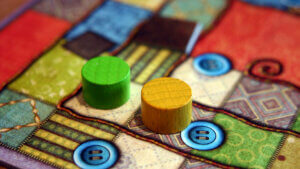 On the other side lies Patchwork, a game for two just as cutthroat or pleasant as you want it to be. Placing tiles tetris-style on your board starts out easy, but quickly turns into a contest between income, shapes, and movement on a track that’ll seem all too short. While you can try to play your own board and ignore your opponent, plotting the right piece to move you ahead and grab those few, delicious single square spots forces a glance or two at your partner’s play. Jumping past the piece they want, or snatching it before they can, is a tasty trick sure to keep you cackling all the way to the dog house.
On the other side lies Patchwork, a game for two just as cutthroat or pleasant as you want it to be. Placing tiles tetris-style on your board starts out easy, but quickly turns into a contest between income, shapes, and movement on a track that’ll seem all too short. While you can try to play your own board and ignore your opponent, plotting the right piece to move you ahead and grab those few, delicious single square spots forces a glance or two at your partner’s play. Jumping past the piece they want, or snatching it before they can, is a tasty trick sure to keep you cackling all the way to the dog house.
Both Bohnanza and Patchwork are smallbox delights, with the latter coming in a thousand different themes. Take’em anywhere, and know you’re guaranteed a good time.
Field Day
This sampler’s platter of Uwe Rosenberg’s library is just that, a sample. Any fan of Euro-style worker placement games, pleasant themes, and depth that emerges after multiple plays deserves to give any of these titles a look.
If you had to pick just one, I’d give Agricola the nod for its classic appeal, the tight play, and the cute meeples. It plays great from 2-4, doesn’t take too long, and leaves you happy no matter the final score because, as with most everything Rosenberg, you’ll have built something lovely by the end.
Written by Adam Knight
Spinning stories and playing games under the direction of his two cats, Adam delights in the roll of the dice and a well-told tale. Find more of his adventures at Black Key Books.

